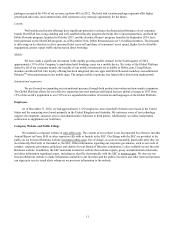Orbitz 2014 Annual Report Download - page 20
Download and view the complete annual report
Please find page 20 of the 2014 Orbitz annual report below. You can navigate through the pages in the report by either clicking on the pages listed below, or by using the keyword search tool below to find specific information within the annual report.20
regulatory or licensing requirements or any interpretation of such requirements by the regulatory authority. Our failure to
comply with any of these requirements or interpretations could have a material adverse effect on our operations. In addition, the
various regulatory regimes to which we are subject may conflict so that compliance with the regulatory requirements in one
jurisdiction may create regulatory issues in another.
Because we process, store and use customer information, we are subject to additional risks as a result of governmental
regulation and conflicting legal requirements regarding customer information. In the processing of customer transactions, we
receive and store a large volume of personally identifiable information. This information is increasingly subject to legislation
and regulations in numerous jurisdictions around the world. This legislation and regulation is generally intended to protect the
privacy and security of personal information, including credit card information that is collected, processed and transmitted in or
from the governing jurisdiction. If domestic or international legislation or regulations are expanded to require changes in our
business practices, or if governing jurisdictions interpret or implement their legislation or regulations in ways that negatively
affect our business, we could be adversely affected. Travel companies have also been subjected to investigations, lawsuits and
adverse publicity due to allegedly improper disclosure of passenger information. As privacy and data protection have become
more sensitive issues, we may also become exposed to potential liabilities as a result of differing views on the privacy of travel
data. These and other privacy concerns could adversely impact our business, financial condition and results of operations.
Our business is also subject to laws and regulations relating to our revenue generating and marketing activities, including
those prohibiting unfair and deceptive advertising or practices. Our travel services are subject to regulation and laws governing
the offer of travel products and services, including laws requiring us to register as a “seller of travel” in various jurisdictions
and to comply with certain disclosure requirements. As an OTC that offers customers the ability to book air travel in the United
States, we are also subject to regulation by the Department of Transportation, which has authority to enforce economic
regulations and may assess civil penalties or challenge our operating authority.
We are involved in various legal proceedings and may experience unfavorable outcomes, which could affect our
financial position.
We are involved in various legal proceedings, including, but not limited to, actions relating to intellectual property, in
particular patent infringement claims against us, tax disputes throughout the United States, employment law and other
negligence, breach of contract and fraud claims, which involve claims, in the aggregate, for substantial amounts of money or
for other relief or that might necessitate changes to our business or operations. The defense of these actions is both time
consuming and expensive. In addition, historically, our insurers have reimbursed us for a significant portion of costs we
incurred to defend cases related to use or occupancy tax of hotel accommodations that some states and localities impose (“hotel
occupancy tax”). We will not receive any additional insurance reimbursements in future periods as our insurance coverage has
now been exhausted. Litigation is inherently unpredictable and unfavorable resolutions could occur. While we generally cannot
estimate our range of loss, except for tax matters, if any of these legal proceedings were to result in an unfavorable outcome, it
could have a material adverse effect on our business, financial position and results of operations.
We may not be effectively protecting our intellectual property, which would allow competitors to duplicate our products
and services. This could make it more difficult for us to compete with them.
Our success and ability to compete depend, in part, upon our technology and other intellectual property, including our
brands. Among our significant assets are our software and other proprietary information and intellectual property rights. We
rely on a combination of copyright, trademark and patent laws, trade secrets, confidentiality procedures and contractual
provisions to protect these assets. However, we have a limited number of patents, and our software and related documentation
are protected principally under trade secret and copyright laws, which afford only limited protection, and the laws of some
jurisdictions provide less protection for our proprietary rights than the laws of the United States. We have granted Travelport an
exclusive license to our supplier link technology, including our patents related to that technology. Under the exclusive license,
Travelport has the first right to enforce those patents, and so we will only be able to bring actions to enforce those patents if
Travelport declines to do so. Unauthorized use and misuse of our intellectual property could have a material adverse effect on
our business, financial condition and results of operations, and the legal remedies available to us may not adequately
compensate us for the damages caused by unauthorized use.
Further, intellectual property challenges have been increasingly brought against members of the travel industry. These
legal actions have in the past, and might in the future, result in substantial costs and diversion of resources and management
attention. In addition, we may need to take legal action in the future to enforce our intellectual property rights, to protect our
trade secrets or to determine the validity and scope of the proprietary rights of others, and these enforcement actions could
result in the invalidation or other impairment of intellectual property rights we assert.
























